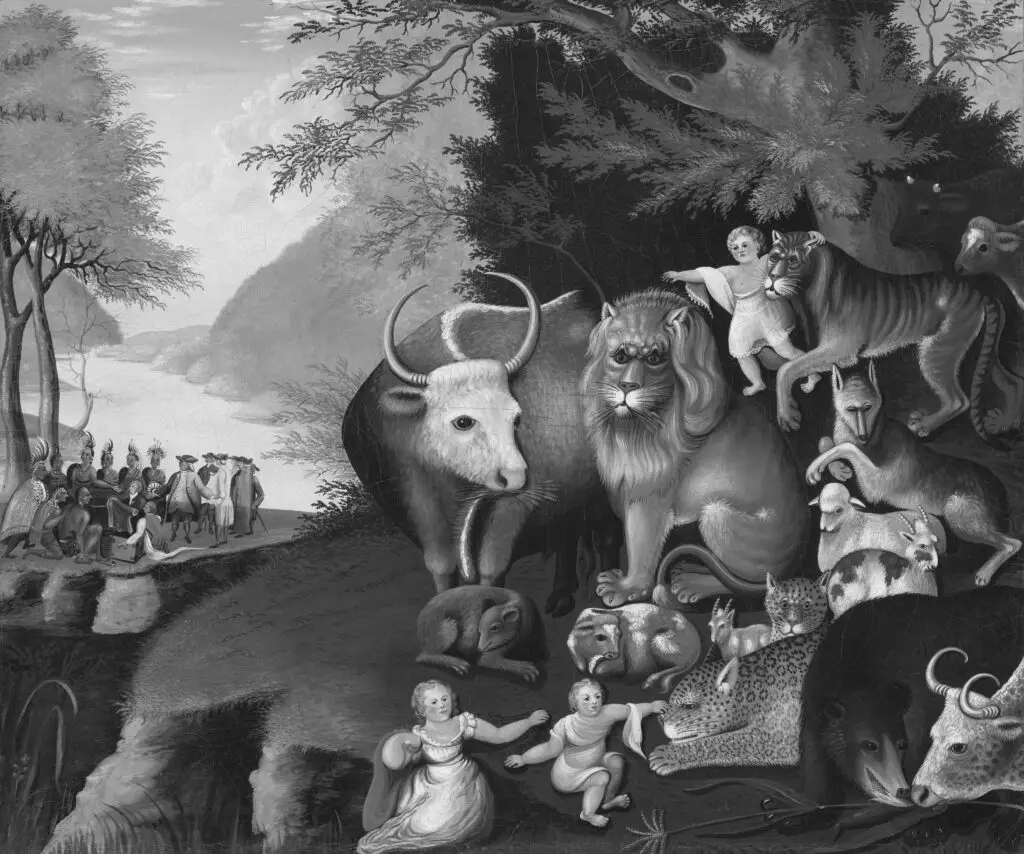Thought leadership should be fun, fast, and fearless. You tap into excitement about new ideas and advocate for something better. That’s the mindset behind The Idea Sled. Projects glide forward gracefully. It’s the momentum of commitment. This newsletter shows you how.
Generalists can add immense value by bridging gaps and ensuring that different parts of an organization work harmoniously. But when they try to pose as specialists, they risk creating unnecessary complexity, diluting their true strengths, and eroding trust. We can look to classical stories about animals to find answers to these dilemmas.
The Dog in the Manger
“There was a vicious dog lying in a manger full of hay. When the cattle came and wanted to eat, the dog barred their way, baring her teeth. The cattle said to the dog, ‘You are being very unfair by begrudging us something we need which is useless to you. Dogs don’t eat hay, but you will not let us near it.’”
In a few short lines, this Classical fable (only sometimes attributed to Aesop) explains a common situation that bedevils thought leadership projects, marketing initiatives, and many other efforts. It paints a picture of what I call “false stakeholdership.”
False Stakeholders and Thought Leadership
False stakeholders insert themselves into organizational processes and derail them despite having no legitimate role in a value exchange. Thought leadership projects often bring these false stakeholders into the “manger” of meeting rooms and Zoom calls.
In theory, thought leadership could directly communicate insight between a thought leader and a decision maker. Insights about particular industry challenges, solutions, or trends could go directly from the thinker to someone who could directly act on that thinking.
Yet, in practice, thought leadership takes production. Resources from marketing and communications (among other functions) play a role in coordinating resources to create and distribute thought leadership artifacts. Sometimes, these producers even commission the work from thought leaders because it’s part of a marcomm strategy.
Dogs Don’t Eat Hay
In healthy organizations, production resources integrate and connect between the thought leader, the strategist, the writer, the designer, the digital publisher, and others. In other words, marketers and communicators are generalists.
They manage various tasks, make connections across different functions, and apply their broad understanding to support. However, they also understand where their role ends and where the roles of specialists with deep expertise in their field begin.
The resulting thought leadership remains a strong exchange of value between a thinker and recipient. The hay is there for the ones who eat it.
In unhealthy organizations, production resources can’t be content to produce. They begin to interfere and dictate subject matter.
This stakeholdership is false because they don’t have a stake in what gets said to whom or how. It’s often predicated on the fear that their roles may seem less relevant than deep vertical specialists. This fear drives them to create a veneer of specialization (pseudo-specializations such as content), positioning their roles as more complex than they are.
The resulting thought leadership is left with only a residue of value between a thinker and recipient—general audience engagement and other misalignments introduced by pseudospecialists water it down. Or irrelevant language detracts from the main message to satisfy a keyword strategy. The dogs snarl, but the cattle don’t eat.
False Stakeholdership and Non-Problems
In thought leadership, engagement and SEO are non-problems. Content is a non-thing. Generalists prevent others from accessing resources or processes (for creation and distribution), not because they need them, but because they are guarding their perceived territory.
The sad part of the story is that generalists can confidently and happily create value, too, if they allow themselves to do so, and if they work within organizations where generalist roles are respected and rewarded.
The Power of Generalists
“A fox knows many things, but a hedgehog knows one big thing.”
This line, found as a fragment attributed to the Ancient Greek poet Archilochus (6th century BCE), has had a long history as a crystallized statement of the difference between generalists (foxes) and specialists (hedgehog). It’s not necessarily better to be one than the other.
The fact is, generalists can create enormous value when working alongside specialists rather than trying to outspecialize them with a fake discipline. Embracing the power of generalists as inherent strengths, they add value by connecting the dots, facilitating collaboration, and bringing perspective to specific initiatives.
The true power of generalists lies in their ability to connect, adapt, and integrate diverse perspectives—not in pretending to be something they’re not. For example, a generalist marketer might not be an expert in a specific product line but excels at connecting various marketing strategies to align with the overall business strategy.
Similarly, a generalist writer can distill complex ideas from specialists into accessible, impactful content that resonates with a broader audience. These generalists act as bridges, ensuring that different parts of the organization work together harmoniously. When I work with hedgehogs in the specialized world of institutional financial services, I make it clear that I am working with them as their thinking partner to help them articulate their insights. But the insights are theirs, and I don’t bristle with defensive writer-speak to protect myself.
The Pitfalls of Pseudospecialization
When generalists attempt to masquerade as specialists, they risk undermining their own strengths and creating unnecessary complexity within an organization, just like hedgehogs trying to roll themselves into a spiny ball for protection. Pseudospecialization often leads to artificial problems or misaligned priorities that don’t serve the organization’s true needs.
For instance, a generalist marketer might overcomplicate a strategy to appear as a specialist, resulting in wasted resources and confusion. Or a generalist writer might invent fake best practices, preying on the inherent insecurity many people have about their writing skills. It’s like a mechanic who intimidates a consumer into unnecessary repairs because they don’t understand auto repair—these writers may exaggerate the difficulty or importance of certain writing techniques to justify their role, but their spines are only for show
The true power of generalists lies in their ability to connect, adapt, and integrate diverse perspectives. Embracing their genuine role ensures they remain essential to the success of initiatives like thought leadership. Pseudospecialization not only dilutes the generalist’s value but also erodes trust. When generalists overreach, trying to operate in areas requiring deep expertise they lack, their contributions can become less credible, reducing their effectiveness as facilitators and problem-solvers. At the next go-around, specialists will be much more suspicious of what generalists offer and whether it’s even worth engaging at all.
Creating A Peaceable Kingdom
How can the manger see peace again and the conflict between foxes and hedgehogs find resolution? I firmly believe thought leaders want to trust marcomm resources. They want support in getting thought leadership produced. They even want guidance on using media channels (owned, social, earned, in person) better.


But marketers have to take the first step. In the manger scenario, they have to stop snarling and let the cattle have their hay in peace. Show thought leaders you are there to support them and use your fox-like powers to help them bring their deepest insights to the surface.
Three Grace Notes
“For the possibilities of being different from what one is are infinite. Once one has negated oneself, however, there are no longer any particular choices. There is only one aim: always, at any given moment, to be different from what one is; never to assert oneself, but with infinite pliancy to become anything else, so long as it is not oneself. It requires an inhuman alertness not to betray oneself, to conceal everything, and yet have no definite secret to cling to.” —Hannah Arendt, Rahel Varnhagen: The Life of a Jewish Woman
“I was thinking of the virtues of difficulty and of how people who can find no reflection of themselves in their own circumstances might require proof of some boundlessness to the human soul, some distant and inaccessible goal toward which it reaches – might need to see the record of those attempts and to realise how far people have been prepared to run the risk of not being understood in making them. Not to be understood is effectively to be silenced, but not understanding can in its turn legitimise that silence, can illuminate one’s own unknowability.” —Rachel Cusk, Parade
“Since words exist and are in a sense agents in themselves which establish connections and relations between man and man, and man and the world, and are capable of ‘acting’ upon them, they are one of the most realistic representations we have of the concept of force which is either not directly observable or is a metaphysical notion which we find necessary to use.” —Marshall Sahlins, The New Science of the Enchanted Universe: An Anthropology of Most of Humanity
Note: The links above are affiliate links. I’m using them in lieu of paid subscription tiers or digital tip jars. Seems like a much more graceful way to generate financial support while sharing more thinking and writing that can guide thought leadership.




